COMPLETE EPISODE GUIDE WITH CRITICAL COMMENTARY
Season 3 (1961-62)
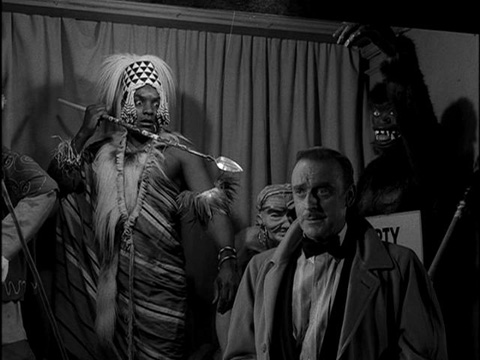
SEARCH THIS GUIDE BY SEASON: Season 1 (1959-1960) ; Season 2 (1960-1961) ; Season 3 (1961-1962) ; Season 4 (1963) ; Season 5 (1963-1964)
Rating Guide:
I - Superior; II - Excellent; III - Very Good; IV - Fair;
V - Below Average; VI - Not Good.
SEASON 5 ARTICLE
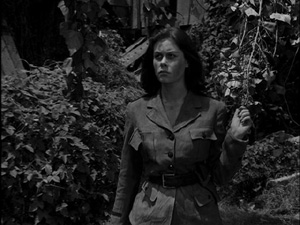
ORIGINALLY BROADCAST AS EPISODE 066
STARRING CAST: Charles Bronson, Elizabeth Montgomery
WRITER: Montgomery Pittman
DIRECTOR: Montgomery Pittman
SUMMARY: An American soldier and a Russian soldier find each other in the midst of a broken-down town in the aftermath of war and undergo a battle of wills which eventually leads to a friendship.
REVIEW: II
Hollywood legends Elizabeth Montgomery and Charles Bronson were paired for this remarkably moving tale by Montgomery Pittman. Montgomery had appeared briefly in Serling's "Patterns" when she was a scant 17 years old—here, she has come full circle. Like Agnes Moorehead before her, she plays a character far more violent, rugged and ragged than her long-running role on Bewitched. Bronson was already firmly established as one of that era's showbiz giants, and a better choice for the lead could not have been made. His role in "Two" is a multifaceted one … he serves as the leader of the duo, the defender, the one victim to the other one's impulsiveness, and ultimately, the peacemaker. The sets used for the town streets and stores are perhaps the most impressive aspect of the show. The illusion is of a town that has clearly been beaten up by the ravages of war, right down to the skeletons of a pair of birds in their cage.
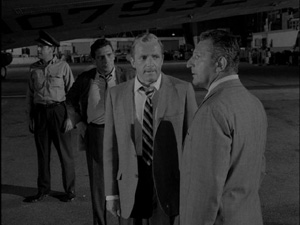
ORIGINALLY BROADCAST AS EPISODE 067
STARRING CAST: Harold J. Stone, Noah Keen, Fredd Wayne, Bing Russell
WRITER: Rod Serling
DIRECTOR: Boris Sagal
SUMMARY: Flight 107 lands, but without any pilots, passengers, or luggage!
REVIEW: V
Like "King Nine Will Not Return" before it, "The Arrival" explores a man's mental struggle over an airplane mishap. This time, it happens to aviation officer Grant Sheckly. The plane comes in, but with no pilots, passengers or luggage. But the results were nowhere near what "The Odyssey of Flight 33" or "The Last Flight" had been. There is some element of mystery in the business but it turns out to be nothing more than a delusion of Sheckly's over an unresolved case of many years ago, and the fellow aviation officers don't offer much more than bland commentary. This all was further reminiscent of the punchline of "And When the Sky Was Opened". Harold J. Stone does alright in the lead but the storyline overall is too limp and clouded with plot ideas scavenged from the previous episodes. Ironically, Boris Sagal (who also directed "The Silence") too fell victim to an airplane in a crash near Portland, Oregon some twenty years later. Fredd Wayne, who played Paul Malloy the newspaper guy, remembers, "I've lived in Santa Monica forever and we shot almost all of it at the Santa Monica Airport. It was fun - Noah [Keen] also lived there for a long time before moving back to New York in his later years and it was great seeing him again at a couple of the Twilight Zone conventions. I think he and I are the last ones left from "The Arrival." Boris Sagal died a long time ago, and Bing Russell and Harold J. Stone are gone."
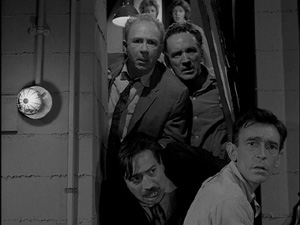
ORIGINALLY BROADCAST AS EPISODE 068
STARRING CAST: Larry Gates, Peggy Stewart, Sandy Kenyon, Mary Gregory, Joseph Bernard, Moira Turner, Jo Helton, Jack Albertson
WRITER: Rod Serling
DIRECTOR: Lamont Johnson
SUMMARY: Doc Stockton, the town G.P. physician, celebrates his fiftieth birthday one evening with family and friends, when suddenly a news report comes in over the radio that some UFO's are approaching Earth rapidly and that everyone with a bomb shelter should get inside it immediately. But Stockton is the only one in the neighborhood with a bomb shelter, much to the dismay of his neighbors.
REVIEW: VI
Serling's companion piece to "The Monsters are Due on Maple Street" is disappointing. Overwritten and lacking in suspense, it was obviously intended to be a didactic piece but has no real fantasy element and is virtually no more than a glimpse of an evening of suburban genteel folk gone sour. They're enjoying cake and ice cream when the broadcast comes, and before you can say the word "predictable", they're thrusting racial insults at each other, punching each other's heads in, and destroying property.
Unfortunately, the sad fact is that situations such as the one presented here have happened all over the planet. But these particular people prove to be so incredibly self-centralized - refusing to use what few resources they do have to ensure their own security and that of their children - that it's hard to feel sympathy for them. The final moment, where they march up and out of the wrecked Stockton house, surely never again to speak to the Stocktons - or each other - is a headshaker.
A point of interest is the presence of one of the actors, a man who later won two Academy awards. Jack Albertson took home an Oscar in 1968 for "The Subject Was Roses" and an Emmy in 1976 for "Chico and the Man". But Sandy Kenyon - who played the nastiest of the neighbors (for those who can't match the name with the face, he's in the bottom right corner of the above photo), has fond memories of the episode. ""The Shelter" was my favorite of the three I did," he said shortly before his passing in 2010. "I played a bigot, and what actor doesn't like playing a bigot?! Being in that milieu, of "The Twilight Zone", you knew immediately that you were working in a first class environment and knew that it would become, and already was, the greatest TV series of all time. No question about that. Everyone doing it and who was connected with it did the best they knew how to. I am thinking of my friend John Anderson [who appeared with him in "The Odyssey of Flight 33"]...and Mary Gregory and I played a *much* nicer couple in episodes of "Lassie." But "Twilight Zone" - I'm a fan." Mary Gregory had the distinction of appearing in both "The Shelter" and "Maple Street" and she actually got a much better part in "The Shelter", her most memorable line, aimed at Marty Weiss and family, "For my money, you're at the BOTTOM OF THE LIST!!"
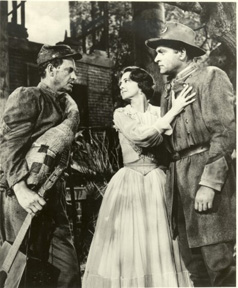
ORIGINALLY BROADCAST AS EPISODE 069
STARRING CAST: James Gregory, Joanne Linville, Warren Kemmerling, Austin Green, Rex Holman
WRITER: Rod Serling
DIRECTOR: Elliot Silverstein
SUMMARY: Confederate soldiers wander down a long, fog-enshrouded road past the house of Lavinia Godwin; a friendly sargeant stops to make conversation with her. They soon discover that everyone coming down the road is dead, including themselves.
REVIEW: III
"The Passersby" was a rather long-winded script of Serling's, and the punchline is semi-evident from the beginning, but there are plenty of bright moments. Elliot Silverstein, who had previously undergone turmoil on his first directorial assignment ("The Obsolete Man" the previous season) tackled it competently, with a group of fine actors at his disposal. Joanne Linville gives an impassioned characterization of Lavinia, who herself was killed by fever but is too headstrong to accept her own death. An actress of extraordinary gifts, her career in TV was unfortunately rather small-scaled but she specialized in dark, dramatic roles such as this. Gregory, a chameleon of an actor who was one of the best in the business at that time, is definitely not youthful enough for the part of the seargent, but this is easily forgotten due to his usual superb portrayal. He was able to keep the square-shaped 'git box' guitar after production ended, and held onto it for more than 20 years before retiring to Arizona.
The highest point of "The Passersby" comes when Lavinia has the notion of finding out who killed her husband...it turns out to be a soldier with one eye shot out, who rides by on a horse. His face is concealed by darkness and all they can hear is his somewhat familiar-sounding voice. When Lavinia takes her rifle to him, it's revealed that he got his comeuppance and was blinded in another line of duty. Two quick camera pans over his partially-mangled face are enough to create a startling few seconds.
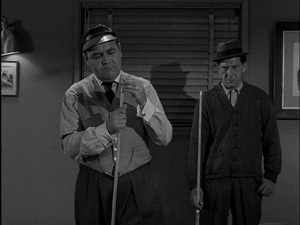
ORIGINALLY BROADCAST AS EPISODE 070
STARRING CAST: Jack Klugman, Jonathan Winters
WRITER: George Clayton Johnson
DIRECTOR: Buzz Kulik
SUMMARY: Jesse Cardiff, a pool player who is known as the best on Randolph Street, summons Fats Brown, the former champ lately deceased, and challenges him to a game.
REVIEW: I
Writer George Clayton Johnson: "I was in Missouri with William Shatner, Jeanne Cooper, OCee Ritch, Leo Gordon and Charles Beaumont...we were shooting Charles' film "The Intruder", based on his novel, in 1961. While I was there, Buck Houghton called me up to say that Rod wanted the ending of "A Game of Pool" changed. I thought what I'd written was really kind of beautiful, with the old gunfighter maintaining the title and outdoing the young pool player. They thought that Fats Brown losing the game and having the younger pool player win it was all very fascinating but I thought it was all very dumb!! The story they came up with had a lot of logical structure to it...you know, starting off in the ghostly pool room in Heaven. Many years later I got two actors together and shot the episode with the original ending, which I still prefer." It wouldn't have the same effect if it took place in any of the San Francisco hotels or Miami hotels. The pool room in heaven was the perfect touch for this episode.
"A Game of Pool" could have gone either way and still been a remarkable piece. In Johnson's finest of the eight stories he contributed to the series, Jack Klugman and Jonathan Winters did astounding work, milking the script for everything it was worth. It just goes to show that if the story is decent on paper, it can be made great if the actors can bring it to life. Klugman played Jesse Cardiff much the way he played Joey Crown in "A Passage for Trumpet" - in his mid thirties but still immature, a little cocky, with the feeling that life had beaten him up, mostly by people who were always rubbing in how good they were at winning and how good he was at losing. At last, he's become the best at something, albeit just a game. As Fats Brown, Winters is controlled and intelligent, a grandfather type, who tries to take the opportunity to educate Jesse but never succeeds.
The dialogue is some of the most thought-provoking and morality-based in all of Twilight Zone... and it somehow all comes out of a simple game of pool. There are many fine insights into life and what it means to be alive, and that games are made up of much more substance than people batting hockey pucks with hockey sticks. Above all, it trivializes the importance that so many people place on competition; Fats Brown may be a pool champ but he didn't win at the expense of the rest of his life - he had a life outside of his (albeit undistinguished) profession. And, competitors who try to make winning the prime objective almost always end up exactly like Jesse Cardiff!
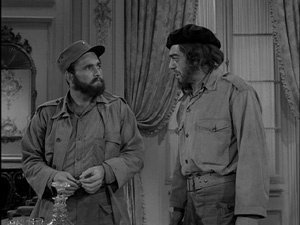
ORIGINALLY BROADCAST AS EPISODE 071
STARRING CAST: Peter Falk, Vladimir Sokoloff, Will Kuluva, Tony Carbone, Arthur Batanides
WRITER: Rod Serling
DIRECTOR: Don Medford
SUMMARY: Ramos Clemente, a Cuban leader, looks into a mirror in his chambers - a magical mirror that allows him to see the reflection of his prospective assassin.
REVIEW: V
Serling's commentary on Castro was slightly disturbing. Pre-Columbo Peter Falk and the supporting cast do their best, and while the script is certainly not Serling's weakest, the material is too cliched and ineffectual.
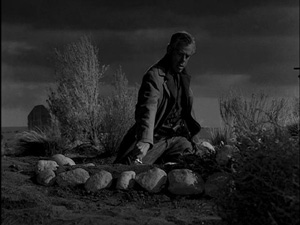
ORIGINALLY BROADCAST AS EPISODE 072
STARRING CAST: Lee Marvin, James Best, Strother Martin, Elen Willard, Lee Van Cleef
WRITER: Montgomery Pittman
DIRECTOR: Montgomery Pittman
SUMMARY: An outlaw named Pinto Sykes gets gunned down before a man named Conny Miller, whom he owes a large sum, catches up with him. When Conny visits Pinto's grave, he gets a most unexpected surprise.
REVIEW: II
Montgomery Pittman's career came to a tragic end when he was only 43 years old. Pittman's involvement with "The Twilight Zone" should have, by rights, been far more than it was. He insisted upon directing his three scripts - "The Grave", "The Last Rites of Jeff Myrtlebank", and "Two", all of which remain popular today. He also directed Serling's "Will the Real Martian Please Stand Up?" and OCee Ritch's "Dead Man's Shoes". His work on all was representation of an enormous - and unique - talent.
"The Grave" is a marvelous tale of the old west, which Twilight Zone tackled on more than one occasion and usually didn't fare as well as this. Like Earl Hamner, Pittman had an ear for how people of a certain place and time talked and acted. A better cast could not have been secured - Lee Marvin as Conny Miller, James Best as the village idiot Johnny Rob, Strother Martin as Mothershed, and Elen Willard as Ione Sykes, sister of the deceased. Her performance is particularly striking. During her mere five minutes of screen time, she displays a multifaceted personality. The level-headed, the inebriated, and ultimately, the most intelligent of the bunch as she delivers the story's shocking punch-line. Her career in TV was also short, with only a few roles to her name ("Perry Mason" and Twilight Zone among them) Just three months later, Best would appear in Twilight Zone again in Pittman's "The Last Rites of Jeff Myrtlebank" in the title role, opposite the idiot brother of his beloved. ""The Dukes of Hazzard" set me free financially," Best recalls, "but I'd like to go to my grave being remembered for something other than the village idiot and Rosco P. Coltrane!"
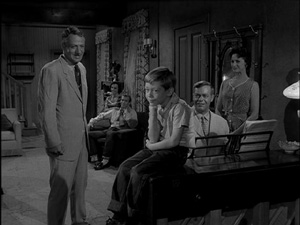
ORIGINALLY BROADCAST AS EPISODE 073
STARRING CAST: Bill Mumy, John Larch, Cloris Leachman, Alice Frost, Don Keefer
WRITER: Rod Serling, based on a story by Jerome Bixby
DIRECTOR: James Sheldon
SUMMARY: Anthony Fremont is six years old, and can turn anyone who doesn't like him into a grotesque, walking horror and then obliterate them to a cornfield, never to be seen again.
REVIEW: II
In popular circles, "It's a Good Life" has become known as "the one where the guy gets turned into the jack-in-the-box." Based on a short story by Jerome Bixby bearing the same title, which is no great shakes, the classicism of the TV episode is thanks to superlative direction and acting, but mainly the direction. James Sheldon was up to the task, which was to get the actors to seem like they are walking a tightrope and to portray personalities that border on hysteria. The critical moment finally comes near the end of the second act, when one of the townsmen becomes drunk, explodes violently, and demands that someone extinguish little Anthony Fremont, perpetrator of all their misery. For a moment, it is Aunt Amy (Alice Frost) who just might be the one to kill, but doesn't quite make it, for fear that she'll become even worse off than she already is. Don Keefer, whose career in TV and film lasted almost six decades, got the honor of being the man banished to the cornfield for good after being turned into a lifeless lifeform. His is a most realistic performance, breaking a clearly visible sweat that no makeup could ever provide. John Larch got a chance to recover from the deadweightedness of "Dust", and his wife was future Oscar winner Cloris Leachman (for "The Last Picture Show" in 1971, during her seven year run as Phyllis on prime-time TV). But it is Bill Mumy's miraculous performance that remains the central fixture of "It's a Good Life". Mumy was able to be menacing while still being cute at the same time. "It was my favorite of the ones I directed," Sheldon recalled. "Great fun. Billy had done so well in "Long Distance Call" a year or so before and I knew he was the one for the part."
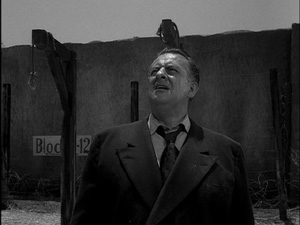
ORIGINALLY BROADCAST AS EPISODE 074
STARRING CAST: Oscar Beregi, Joseph Schildkraut
WRITER: Rod Serling
DIRECTOR: Don Medford
SUMMARY: Captain Gunther Lutze, a former concentration camp leader, returns to visit his homeland after a seventeen-year absence.
REVIEW: I
"Death's Head Revisited" is a powerful testament to the brutalities and endless horrors of the holocaust. Having changed his name, taken new residence on the other side of the world, and tried to forget all the harm he inflicted as a result of 'just trying to follow orders', something deep within called Gunther Lutze back home to revisit his old haunts. Within a span of two hours, he undergoes a transformation of sizeable magnitude from a power-drunk sophist to raving, manicacal bum. The insanity that he'd kept under wraps for so long couldn't hold itself in any longer and he succumbs. Oscar Beregi and Joseph Schildkraut, two European actors whose early work was in German films many years prior, display remarkable chemistry in their confrontation; Schildkraut as the wise, tired Dachau "caretaker", who is actually just a ghost, and Beregi as if he's literally trying to fight off the devil. Schildkraut played a similar role as Anne Frank's pious father in the feature film version of "The Diary of Anne Frank" in 1959 with Ed Wynn and Shelley Winters. H.M. Wynant, co-star of "The Howling Man", had this to say about "Death's Head Revisited"... "They called me up and asked me to do [Joseph] "Pepi" Schildkraut's part in the radio version of it so many years later - I enjoyed doing that. Of course, the original episode stands as a classic all its own. Don Medford, who directed the original...he directed a few live TV shows that I was in. It was very challenging, working with him - every single camera angle was planned out in advanced. I'd come in, with everyone else, and the floor would be marked with numbers. 'First you go to '3', then you move over to '4', and so on! It was crazy. But the results Don got were terrific, it was difficult though. Ted Post and some others were easier." Indeed, Medford created Dachau with the casting of the incomparable Oscar Beregi for Lt. Gunther Lutze. With the exception of the English signs and markings, his sets were Germany at the height of the Hitler regime. In 1961, Dachau and Bergen Belsen were still remembered by most of the world. But, more than five decades later, this segment of "The Twilight Zone" captured those ghoulish and gruesome few years better than any other historical documentation out there. And Rod Serling was the only one who could do it on television.
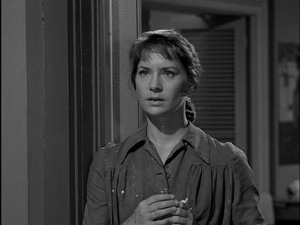
ORIGINALLY BROADCAST AS EPISODE 075
STARRING CAST: Lois Nettleton, Betty Garde, Tom Reese, William Keene, Jason Wingreen
WRITER: Rod Serling
DIRECTOR: Anton Leader
SUMMARY: Earth has changed its orbital pattern and moves closer to the sun, causing everyone and everything to burn up...or so it seems.
REVIEW: II
In "The Midnight Sun", Serling worked skillfully with the possibility of Earth deviating from its usual elliptical pathway. Thanks to Tony Leader's splendid direction, the result was no less than a believable show, even if not totally accurate on a scientific front. Since Earth orbits the sun, the sun will set at a certain time every day regardless of how close it gets to the sun...but there will come a critical point where the planet can't get any closer without burning up. It turns out that this is the material of a dream, and not the reality of the story. The Earth is actually moving away from the sun. But in order for Earth to be dark and frozen all the time, not only would it have to move away from the sun, it would have to stop rotating - or move far out of the interplanetary system.
Most of the credit is due the crew for coordinating oil-based makeup jobs applied to the actors and generating a sense of realism with clever special effects that included a bursting mercury thermometer and a painting whose image melts into a mass of colored pigment.
In the leads were Lois Nettleton, an actress with a marked ability to display genuine reaction, and Betty Garde as the panicky and unstable landlady who rambles on and on about nonsense. Both actors had done live television and consequently, they were used to working under stringent conditions. They were able to capture the spirit of the austere situation and it pays off greatly. As the intruder who just lost his wife and newborn baby to the heat, Tom Reese also does admirably. The climax of the show is a great one, in the true spirit of Twilight Zone...the thermometer bursts just after Mrs. Bronson collapses and dies. Norma lets out a scream as a quick cut is made to the planet as it actually is...black and frozen.
Van Cleave's incidental music for the episode is a forlorn and colorful depiction of doom. Scored for flute, piano and synthesizer, it is a perfect score, surely among the finest accompaniments ever written for any television episode.
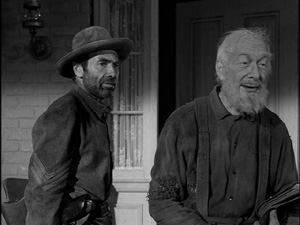
ORIGINALLY BROADCAST AS EPISODE 076
STARRING CAST: Gary Merrill, Ben Cooper, Vaughn Taylor, Jack Mann
WRITER: Rod Serling, based on a story by Manley Wade Wellman
DIRECTOR: James Sheldon
SUMMARY: Hearing rifle fire down in the valley, Joseph Paradine goes down to investigate and finds an entire army of soldiers frozen in space and time. An encounter with an old man who practices witchcraft reveals why.
REVIEW: IV
Gary Merrill and Ben Cooper had appeared in numerous radio programs in the 1940's and reunited in 1962 for this episode. Although Merrill, Cooper, and Vaughn Taylor (seen last in "Time Enough at Last") are all excellent in the leads, "Still Valley", like "Elegy" before it, tries to use a gimmick that simply does not work well - people literally frozen in time. However, director James Sheldon was obviously careful about casting the extras who play the still army, and they were superior to those in "Elegy". "Gary Merrill was such an intense actor," Cooper recalled many years later. "Jim had me lessen my performance; I was trying to ham it up like Gary Merrill was doing, and he had me play it less. Actors always felt comfortable working for Jim. He was never one for asking actors to do things or be people that would make them look stupid or like jerks, as sometimes can happen." Sheldon and Cooper's first meeting was around 1941, when Sheldon came to see Ruth Hammond in a Broadway play that the eight year old Cooper also appeared in. "We've been friends ever since, and we did other shows together as well. ""Still Valley" was wonderful, though...on "The Twilight Zone", it was different than it was on all the other shows of the day. You felt the obligation to uphold the tradition of the great production values. It was a class act from start to finish."
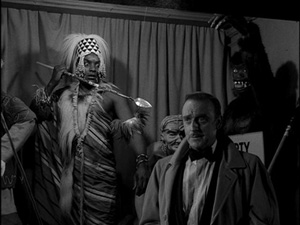
ORIGINALLY BROADCAST AS EPISODE 077
STARRING CAST: John Dehner, Walter Brooke, Emily McLaughlin, Jay Adler, Jay Overholts, Hugh Sanders
WRITER: Charles Beaumont
DIRECTOR: William Claxton
SUMMARY: Recently returned from a trip to Africa, land developer Alan Richards succumbs to superstition imposed by witch doctors.
REVIEW: III
Rod Serling wrote tales about fear of the unknown, but did not himself 'live' in his own personal Twilight Zone as Charles Beaumont did. For this story, Beaumont came up with an unusual premise about a rather ordinary businessman, an architect/land developer who has an assignment in Africa. Back home, he faces all kinds of weirdness associated with this.
One of the scariest moments in all of Twilight Zone comes when Alan Richards (John Dehner) passes by a tribal costume store where a masked African man holding a spear is seen in the display window. Richards turns his back to the window at the very moment when the wide-eyed man looks like he's going to stab him right through the glass. Suddenly, Richards feels a hand on his shoulder. It turns out to be a bum (Jay Adler) who appears from out of nowhere and asks for food money - Richards obliges and also pays the man to escort him home. But the bum vanishes into thin air. Barely making it back to the apartment in one piece, he pours a drink as a lion grunts repeatedly from the bedroom...just in time to see the torn corpse of his wife and draw his own last several breaths of life.
Wrought with superstition, voodoo and spooky objects including a human finger and dead goat in the hallway, "The Jungle" was Beaumont expressing his own such fears through and through. A highly intelligent man, the gifted writer was terribly superstitious and often beaten up by his own cowardliness. In every sense, the main character, Alan Richards, questions his own sanity at every turn. Is he mentally sound? Is he going mad? Is any of this even happening? One highlight that people seem to remember, which does not appear in most of the syndication prints, is the sequence in Central Park where Richards gets into a cab and the cabbie drops dead en route, leaving him stranded and forced to walk home through a chorus of roaring lions and squacking birds. This is goes on for perhaps a minute or so too long, but the payoff is well worth the wait.
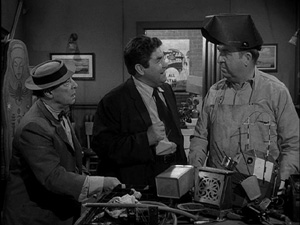
ORIGINALLY BROADCAST AS EPISODE 078
STARRING CAST: Buster Keaton, Stanley Adams, Jesse White
WRITER: Richard Matheson
DIRECTORS: Norman Z. McLeod and Leslie Goodwins
SUMMARY: Woodrow Mulligan, a janitor, works in the laboratory of an inventor who makes a time helmet that can transport the wearer into the past or the future. Mulligan travels forward to 1962 and meets Rollo, who longs to return to the past.
REVIEW: IV
Buster Keaton on "The Twilight Zone"...who'da thunk it? Unfortunately, "Once Upon a Time" supposedly fell victim to budgetary problems. In Matheson's script, there is much more action, including a sequence with Mulligan riding his bicycle through a supermarket in the 1962 segment; Keaton would have been able to show off his stuff even more. A heavy smoker for most of his life who suffered from severe emphysema in his later years, it's amazing that Keaton did this comedy so well, so late. He runs long distances, rides bicycles and falls off them, and is constantly on the move. The 1890 sequences at the beginning and end were well-edited, capturing the style of Buster Keaton films of the twenties. To boot, a lively score for player piano was included. The material in between suffered. Mulligan dodges police and undergoes a few mishaps, but there is precious little of the slapstick or physical comedy that Keaton was so accomplished at. Veteran character and one-time Maytag spokesman Jesse White carries most of the show as the cranky repair shop handyman, who constantly tells Rollo (Stanley Adams) to keep his hands off the tools and cheats them on the bill after he fixes the helmet. Still, Keaton is at his wide-eyed, wild-eyed best once again, making it all worthwhile.
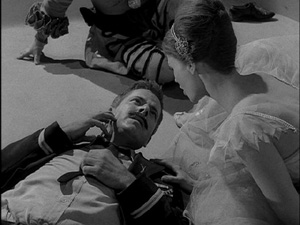
ORIGINALLY BROADCAST AS EPISODE 079
STARRING CAST: William Windom, Susan Harrison, Murray Matheson, Clark Allen, Kelton Garwood
WRITER: Rod Serling
DIRECTOR: Lamont Johnson
SUMMARY: Five characters - a clown, hobo, ballet dancer, bagpiper, and army major are thrown together in a room...wondering how they got there.
REVIEW: II
"Five Characters" is a superbly-acted little story that almost took the form of a skit or a one-act play. William Windom (Emmy Award winner for best actor in the short-lived TV series "My World and Welcome To It") lead the five-person drama, and it was a tour de force for him. His naturally brusque voice (which by way of echoing sound effects sounds far more strident) was perfectly suited to the person of the frustrated army major. Also impressive is British actor Murray Matheson (no relation to principal writer Richard Matheson), playing the infinitely gleeful clown who swears he knows nothing about circuses or, for that matter, how he became a clown. A dimly lit depository...and just how long have the other four been there? Are they in hell? In limbo? In a time warp? Good question.
The memorable human ladder sequence generates a fair amount of sweat, and not only for the audience. It also tested many facets of strength of the actors themselves, not only physically. In the end, the ambitious one got out. And he came back, not under any better circumstances.
A large, cylindrical shell (the barrel) with a light at the top was the entire stage for "Five Characters", probably the most inexpensive episode produced of all 156 in the canon. Save for the street scene at the end, was shot in these seemingly tight confines.
The small dolls made by William Tuttle to resemble the actors are dead-on replicas. Tuttle did his share of fine mannequin construction, and this episode boasts some of his best. Look closely to see a teardrop streaming down one side of the ballerina's face as the camera pans to each of the five characters.
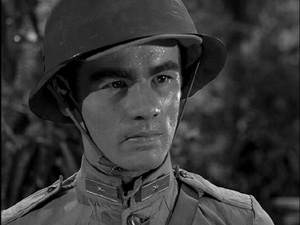
ORIGINALLY BROADCAST AS EPISODE 080
STARRING CAST: Dean Stockwell, Albert Salmi, Jerry Fujikawa, Leonard Nimoy
WRITER: Rod Serling
DIRECTOR: Buzz Kulik
SUMMARY: August, 1945 in The Philippines. Lieutenant Katell gets his orders to take over a platoon of lazy men. Determined to bring some order into the platoon, he orders them to kill until they are ordered to stop killing. But Katell has a sudden change of heart after taking a short trip back to 1942 as a Japanese soldier!
REVIEW: III
Future "Quantum Leap" star Dean Stockwell experiences a brief and most extraordinary taste of 'the other side' in "A Quality of Mercy." With equal skill, he plays both a Japanese officer and a young, ever-frustrated American lieutenant. The former task was undoubtedly quite a challenge, but thanks to excellent makeup and Stockwell's remarkably fitting features, it pays off well. Fine also are Albert Salmi and Jerry Fujikawa. As is usually the case, the one who yells the loudest is always just as insecure as everyone else, if not more so. But Dean Stockwell was no stranger to stories involving Japan. With George Takei, Dick York and Harry Guardino, he appeared in Joseph Stefano's Playhouse 90 teleplay "Made in Japan" in 1959.
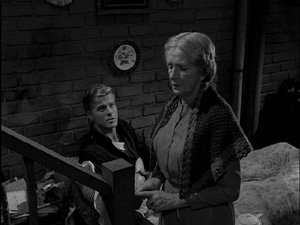
ORIGINALLY BROADCAST AS EPISODE 081
STARRING CAST: Gladys Cooper, Robert Redford, R.G. Armstrong
WRITER: George Clayton Johnson
DIRECTOR: Lamont Johnson
SUMMARY: Wanda Dunn lives in a building that is about to be condemned. She refuses to leave; she has nowhere else to go. One afternoon she hears a shooting and a man's cries for help outside her door. She is reluctant to open the door for fear that it might be Mr. Death, who will take her away from the land of the living.
REVIEW: III
In "One for the Angels", Serling lets his main character go peacefully after accomplishing something worthwhile. George Clayton Johnson took a different spin on this idea, focusing instead on the fear associated with moving on to our next experience. Poignant, gentle, and touching, even the most fearful can walk away with a good feeling about departing from Earth. If we're lucky, we'll go as quietly as Wanda Dunn does, and if The Good Lord does call us home, that the angel sent down to claim us will be as pious as Robert Redford's Mr. Death.
""Nothing in the Dark" is one of the best I ever did," says Johnson. "Lamont Johnson did great things with my stories...they were done with such grand power. I was amazed at his literacy and his approach. Whenever I show someone my best TV scripts, I always pull that one out. "
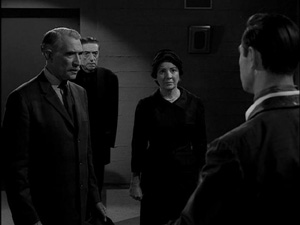
ORIGINALLY BROADCAST AS EPISODE 082
STARRING CAST: Joseph Wiseman, Katherine Squire, Trevor Bardette, Gage Clark, Josip Elic
WRITER: Rod Serling
DIRECTOR: Lamont Johnson
SUMMARY: Affluently wealthy Paul Radin tries to get people from his past who did him great injustice to make apologies to him.
REVIEW: V
Canadian-born actor Joseph Wiseman always portrayed sophisticates well, as evidenced by the title role in "Dr. No", the first James Bond movie starring Sean Connery, also in 1962. Here, he plays owner of a skyscraper (or two or three?) who simulates a doomsday depiction in effort to frighten three people from his past into apologizing for rather prosaic incidents (his supposed driving a girl to suicide, getting court-martialled for disobedience, and cheating on a high school examination). Needless to say, he succeeds in doing little more than making an army colonel, his high school English teacher, and a minister even more angry, and makes himself go insane. Nothing is accomplished.
Despite some nice set design, the episode fails, mainly due to the performances. The characters portrayed by Trevor Bardette, Katherine Squire, and Gage Clark are bland and unimportant figures. Wiseman had a long and distinguished career in the theater and in television, which happened to include a segment of Serling's "Night Gallery" with Diane Keaton wherein he played a dying man. But here, the character he plays is too broadly written to be fully effective.
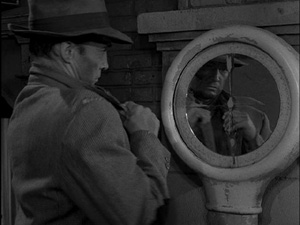
ORIGINALLY BROADCAST AS EPISODE 083
STARRING CAST: Warren Stevens, Joan Marshall, Richard Devon, Ron Hagerthy, Joe Mell, Ben Wright, Harry Swoger
WRITER: OCee Ritch
DIRECTOR: Montgomery Pittman
SUMMARY: Nathan Edward Bledsoe, a bum, wakes up an finds a pair of fancy loafers from a dead gangster who's been dumped in an alley. Consequently, he finds that he's also stepped into and the expired man's soul.
REVIEW: III
Written by OCee Ritch but credited to Charles Beaumont, this is an unusual show that isn't easily categorized thematically. The atmosphere is swanky, and for lack of better comparison, it plays more like a late-night low-budget movie. Most of the characters are more or less intangible stick figures, lacking any depth or dimension, and their intentions are questionable. Warren Stevens' Nate Bledsoe almost seems too intelligent to be the kind of street dweller that the character was written to be but he had a good approach to the role and it worked quite well. Joan Marshall does nicely as Wilma, the sexy wife of the deceased, and the few prickly scenes they share were excellently done. Although the idea is a good one, and the episode fine as a whole, the viewer is left to wonder just how long this rather unimportant cycle of events will persist, and why? But in true TZ fashion, the atmosphere kinda brings it on home and it ranks more or less favorably with the average TZ episode.
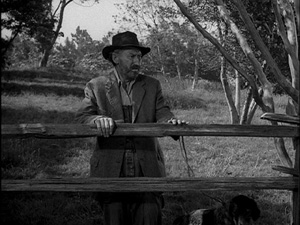
ORIGINALLY BROADCAST AS EPISODE 084
STARRING CAST: Arthur Hunnicutt, Jeanette Nolan
WRITER: Earl Hamner, Jr.
DIRECTOR: Harold Schuster
SUMMARY: Hyder Simpson and his dog, Rip, go out raccoon hunting one evening. When they return home the next morning, they find two men burying a dog and a group of pallbearers taking a coffin out of his house and no one can see or hear them. Hyder and Rip wander down Eternity Road and are greeted by two gatekeepers - one at the gates of Hell and the other at the gates of Heaven.
REVIEW: III
"The Hunt" is generally far underrated. It remains a perennial favorite of Twilight Zone writer George Clayton Johnson, and features a fine performance by Arthur Hunnicut. Although his characterization of Hyder Simpson is slightly monotonous at times, he does the part a great deal of justice having come from Arkansas and like Hamner himself (a native of Virginia), he was on familiar turf with corn-pone characters. The show also greatly benefits from outdoor shooting and realistically-designed sets. Where it comes up short is an overall lack of energy and scenes that simply go on too long, plus a rather predictable conclusion. Of course, it is the hound dog that keeps Simpson out of Hell, thus giving the story a happy ending. These so-called backwoods stories were Earl Hamner's trademark, and "The Hunt" was his first for television. Hamner remains the most unusual of the core of Twilight Zone writers. His expertise came in crafting folklore tales of country or small-town folk with clever twists. "The Waltons" picked up where "The Hunt" began. On occasion, he wrote a script that intertwined or essayed urbane folk and the evils of life in the concrete jungles.
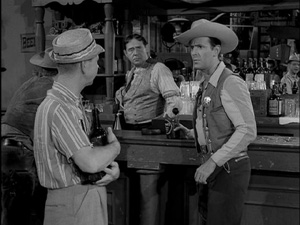
ORIGINALLY BROADCAST AS EPISODE 085
STARRING CAST: Larry Blyden, Arch Johnson, Robert Cornthwaite
WRITER: Rod Serling
DIRECTOR: Christian Nyby
SUMMARY: Rance McGrew, Hollywood actor and star of a cowboy TV show, gets his bluff called when Jesse James comes down from the heavens and tells him that he isn't doing justice to his good name!
REVIEW: V
Larry Blyden was a broad-loving jewel thief in "A Nice Place to Visit". This time he is Rance McGrew, an untalented hotshot-yet-Emmy-winning Western actor who plays Jesse James on a TV series. Several dead cowboys in heaven get up a coalition to get McGrew off the air...or at least to get him to straighten up and fly right. It is Jesse James who comes down from the portals...and he stays around, clad in Hawaiian shirt and suede leather shoes, driving McGrew's convertible and acting as his agent, to make sure he doesn't regress.
The episode has its share of faults, though. The main character was written very tongue-in-cheek and the sets used for the old west are mediocre. The casting of Arch Johnson (whom many remember for his part in "The Sting") as Jesse James nearly sends it all right down the gutter. However, a few things keep it afloat - the humor is laughably corny. Playing the show's director was Robert Cornthwaite, in fine form. Cornthwaite was a hard-working character actor who appeared in loads of prime time TV episodes and B-grade movies. Director Christian Nyby, 10 years earlier, cast him in the memorable part of the PhD scientist in the original "The Thing", which was one of his best roles. In "McGrew", he's the long-suffering house director stuck with a no-talent hick who clumsily breaks props and can't shoot a gun to save his life...week after week, year after year, raking in a damn fortune while more deserving actors starve to death.
As an added bonus, some of the Twilight Zone crew got to take a bit of a bow here- assistant directors, camera operators and assistant DP's, and holding down the boom mics, just as they had in "A World of Difference" (and every episode of the series, for that matter!)
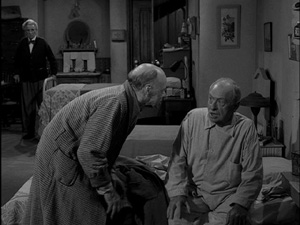
ORIGINALLY BROADCAST AS EPISODE 086
STARRING CAST: Ernest Truex, Russell Collins, John Marley
WRITER: George Clayton Johnson
DIRECTOR: Lamont Johnson
SUMMARY: The residents of an old folks home get transported backwards in time when they play a game called kick the can.
REVIEW: IV
A story for the elderly segment of the viewer demographic, "Kick the Can" is a pleasant - if overly sentimental - story about old age and getting a second chance to be young again. Ernest Truex and Russell Collins are perfectly matched as the lifelong friends Charles Whitley and Ben Conroy. Charles, full of vigor and spark, and Ben, succumbed entirely to decaying bones and decaying of mind. No amount of prodding from his more youthful friend will change Ben...and ultimately it is he who pays the price, destined to spend the rest of his days in isolated loneliness.
The single most inspired, and truly moving, moment of the piece comes when the elderly folks get up out of their beds in the middle of the night and start, literally, kicking the can, their aged selves bumbling about the rest home parking lot and hiding behind trees nearby, just as they'd watched the neighborhood kids do for years and recalling that they'd done the same thing 70 years ago. Suddenly, their haggard voices start to resemble those of the children they've longed to be again, and seconds thereafter, they become those children. It's a powerful and spirit-moving few moments that even the concrete-of-heart can't easily dismiss.
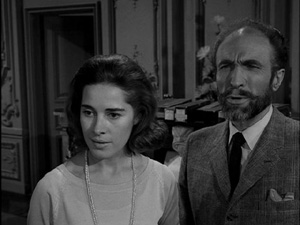
ORIGINALLY BROADCAST AS EPISODE 087
STARRING CAST: Barry Morse, Joan Hackett, Don Durant, Cyril Delevanti, Muriel Landers
WRITER: Earl Hamner, Jr.
DIRECTOR: David Greene
SUMMARY: Fitzgerald Fortune, theater critic, buys a player piano for his wife, a piano which has magical properties.
REVIEW: IV
Earl Hamner's second of eight TZ segments was this old-world, turn-of-the-century-ish, oddly amusing story about a wicked theater critic. The subject is a player piano with the power to reveal the souls of all who hear it. That one could put a certain scroll on the piano at a given moment in time and have it be exactly the music needed to reveal that person's hidden self is perhaps a little too convenient, but it makes for a clever fantasy. The actors all get their turn at the wheel, and each does splendidly. Delevanti, who always turned in ultra-deadpan performances (also of "A Penny For Your Thoughts", "The Silence, "Passage On the Lady Anne") shows his comedic talent in probably thirty of the most gleeful seconds of the entire series, which Morse (pre-Lieutenant Gerard on "The Fugitive") and the late Joan Hackett also clearly enjoyed, in and out of character. The town drama critic is always a man hated, but Fitzgerald Fortune is a critic truly loathed...and it's not hard to see why! Morse has obvious fun with the part. "That was an interesting script. The director, the late David Greene, was an old friend of mine. We'd worked together quite a bit before."
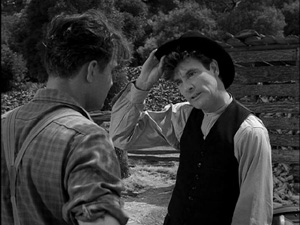
ORIGINALLY BROADCAST AS EPISODE 088
STARRING CAST: James Best, Sherry Jackson, Lance Fuller, Ezelle Poule, Edgar Buchanan, Dub Taylor, Vicki Barnes, Jim Houghton, Pat Hector
WRITER: Montgomery Pittman
DIRECTOR: Montgomery Pittman
SUMMARY: Jeff Myrtlebank is about to go to his grave, but during his funeral he rises up out of the coffin!
REVIEW: II
Few who attend funerals don't envision the dead rising up out of their pine box. But despite all the possibilities, it doesn't happen...except in "The Twilight Zone". In "The Last Rites of Jeff Myrtlebank", the superstitious southerners never will quite know the truth about what happened to Jeff...the dead have been to the other side, after all, and are capable of becoming an agent of a higher power. This ends up working to his benefit, however; he can do whatever he likes, and get away with it! James Best, Sherry Jackson, and Lance Fuller all do wonderfully and the supporting cast who play the townsfolk make the story come alive. There's a fair share of humour as well, such as when personality-disabled Orgram says to Comfort as he sees Jeff coming up the walkway: "I'll bet all your kids are born with horns!" Not sure whatever happened to Sherry Jackson or her career. She had a very good run and then for some reason her engine ran out of fuel!!
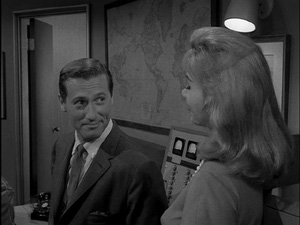
ORIGINALLY BROADCAST AS EPISODE 089
STARRING CAST: Lloyd Bochner, Susan Cummings, Richard Kiel, and featuring the voice of Joseph Ruskin
WRITER: Rod Serling, based on a story by Damon Knight
DIRECTOR: Richard L. Bare
SUMMARY: A new race of nine-foot tall creatures from outer space come to Earth with seemingly friendly intentions to help end world problems. They put an end to such monstrous problems as famine and shortage of natural resources, but in exchange, they have other agendas that are a bit more gruesome!
REVIEW: I
"To Serve Man" was not the most moving or impacting episode of "The Twilight Zone", but it has become one of the most revered. Its sophisticated tone and shocking conclusion are unforgettable. Ordinary day in New York - ambassadors from another world come to the U.N. building with an offer to serve their fellow man, and they do. They also set up visitations for Earth residents to visit their planet. But at a price; they'll all eventually become someone's food! Who knows just how long the Kanamits can continue the cycle without getting executed...or perhaps it's all a one-time practical joke on our stupid race??
In the lead, veteran TV actor Lloyd Bochner does admirable work, supported well by a group of competent actors including Susan Cummings, who like Phyllis Kirk in "A World of His Own" had all the required looks but an unfortunately brief career in TV and film. Playing all of the Kanamit characters was Richard Kiel, who would go on to play similar giants in multiple movies. The voice of the Kanamits was not Kiel's. Kiel had just come from another acting job and did not have time to rehearse the lines. Joseph Ruskin (who had played the genie in "The Man in the Bottle") was called in later to do the voiceovers, and he did them splendidly.
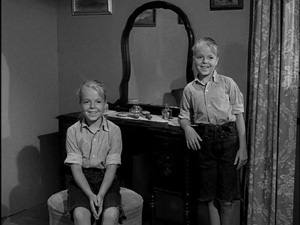
ORIGINALLY BROADCAST AS EPISODE 090
STARRING CAST: Susan Gordon, J. Pat O'Malley, Nancy Kulp, Wesley Lau, Russ Bender
WRITER: Charles Beaumont
DIRECTOR: Richard L. Bare
SUMMARY: Old Ben, a friendly neighborhood senior citizen, can transform himself into monsters, insects, or whatever he wants to be. He becomes good friends with Jenny, a little girl who lives in his apartment building. But the truth comes out about Ben - he's a fugitive from another planet!
REVIEW: III
Susan Gordon, with J. Pat O'Malley and Nancy Kulp, starred in this delightful story by Charles Beaumont. Twilight Zone usually didn't cater to younger audiences, but on rare occasion there would be such a show that did. Gordon, a familiar face on TV in the sixties, was well-cast as Jenny. "That was one of my favorite roles, if not my favorite," she related years later. "I got to run off with a prince, and I got to be a twin at the end...I'd always wanted to be a twin!" The brilliant Nancy Kulp as Mrs. Gann is all too typical of the female neighborhood gossip - the unhappy old maids who are given the task of looking after orphans after their loved ones die. Soon after, she'd begin a long run on "The Beverly Hillbillies" as the Clampetts' legal advisor, Ms. Jane Hathaway. Gordon says of her, "Nancy Kulp was very strong in her performance. She was, in the eyes of a child, someone to really admire." An equally striking performance comes from O'Malley, a much-loved character actor with a gravelly voice who had a long career that began in England and continued in the US when he emigrated around the time of World War II - his first movie was "Lassie Come Home" with Roddy McDowall in 1943. He logged over 200 guest appearances of many staple shows of the day, and 20 years after he did this episode, he appeared on "Three's Company" and "Taxi" as even older codgers and lent his voice to numerous cartoon characters as well. The Twilight Zone casting directors secured him for two more episodes, mainly on account of his distinctive gravelly voice - "The Self Improvement of Salvadore Ross" and "Mr. Garrity and the Graves" in the fifth season. Also seen in the cast are Wesley Lau, who at the time was playing Lt. Andy Anderson semi-regularly on "Perry Mason" (as sometime substitute for the ailing Ray Collins) and Steven Talbot as a neighborhood boy who also had a regular role as Gilbert on "Leave it to Beaver", who later swore off acting and became a highly successful producer of TV documentaries.
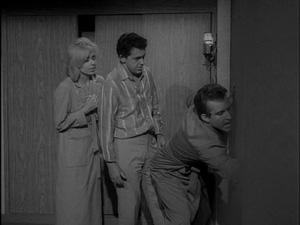
ORIGINALLY BROADCAST AS EPISODE 091
STARRING CAST: Charles Aidman, Robert Sampson, Sarah Marshall, Tracy Stratford
WRITER: Richard Matheson
DIRECTOR: Paul Stewart
SUMMARY: A young girl named Tina finds herself trapped in what could possibly be the fourth dimension.
REVIEW: III
"There is a fifth dimension, beyond that which is known to man..." As there is no concrete way to visualize the addition of a fourth dimension to the three dimensions we're eminently familiar with, Matheson envisioned it is as a sort of transient opening in a floor or wall. The dimension seen is a warped atmosphere that lies in a single plane, with no real orientation. The effect is quite convincing, thanks in large part to George T. Clemens' dead-shot photography.
Charles Aidman co-starred as the physicist-friend of the family in trouble. His performance is controlled and intelligent; the best moments come as he thoughtfully draws geometric bisectors that mark the opening to the territory. Bill seems to understand what's happened, although he is slow to make any rash observations or disturb the flow of things. Not so spectacular are the other two actors who play the parents. The father (Robert Sampson) seems an obtuse individual, lacking even the sense to search the entire property for his daughter before summoning his pal at two in the morning. And when he does make the call, he doesn't do more than order Bill to just "get over to the house, now!" The dense and hysterical mother (Sarah Marshall) casts an even dimmer light on her family's predicament.
One element of "Little Girl Lost" remain as mysterious as the story itself - why the director had an adult dub in most of the girl Tina's lines. It's all too transparent that the person talking is not Tracy Stratford, but "some woman". Even after Tina is pulled out of the fourth dimension, traces of this voice are still audible.
"Little Girl Lost" is true to the TZ mold - it explores man's fear of the great unknown, the shades of gray whose color can never be restored. And in the end, there is no resolve to the mystery that took place on the proverbial Elm Street that night.
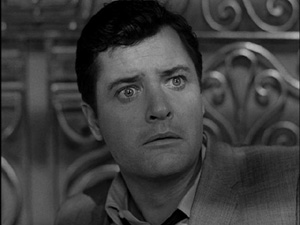
ORIGINALLY BROADCAST AS EPISODE 092
STARRING CAST: Richard Long, Frank Silvera, Shirley Ballard, Betty Harford, Ed Glover
WRITER: Charles Beaumont
DIRECTOR: John Brahm
SUMMARY: David Gurney wakes up one morning in his own home, in his own bed...but the wife he wakes up next to doesn't know who he is. He goes to his workplace but none of his coworkers know who he is. In fact, no one in the world knows David Gurney!
REVIEW: III
Beaumont's sequel to Matheson's "A World of Difference" was this less-dramatic but equally engaging story. Richard Long was a good choice for the lead and he does nicely as an utterly lost man named David Gurney. Playing the psychiatrist was Frank Silvera, who was also an well-known acting coach. Says a former student, "Frank Silvera was a superb teacher who worked in New York with us many years ago. I was in his class, and he taught me so much. He was gifted, both as actor and teacher."
"Person or Persons Unknown" was a tangible show, not because it would ever happen to any person of sound mind but because it explores the intensity of fear of the unknown in a most realistic situation - what would it be like if any of us were to wake up in our own bed with a spouse who didn't know us at all, and go through the day's routine where everyone whom we knew suddenly didn't know us? Or returning from a work vacation and suddenly, the entire workplace had changed hands and we found ourself without a job? The blinklessly wide-eyed expression on Long's face when the tables turn at the end, and he doesn't recognize his "real" wife, taps a resounding note of fear...no words are needed to relate the horror Gurney is experiencing over the cycle beginning yet again.
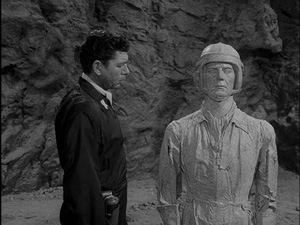
ORIGINALLY BROADCAST AS EPISODE 093
STARRING CAST: Claude Akins, Joe Maross
WRITER: Rod Serling
DIRECTOR: William Claxton
SUMMARY: William Fletcher and Peter Craig, astronauts, land in a rocky canyon on a space asteroid and find a most peculiar race of little people. This causes Craig to become drunk with power.
REVIEW: IV
"The Little People" was the last venture the production company made to Death Valley. It's strength rests on the two-character confrontation of William Fletcher and Peter Craig, played with biting intensity by Claude Akins and Joe Maross in their second and final Zone appearances. Once again, the dialogue is spiced with Serling's trademark platoon talk. The obvious fiction in the miniature world is not completely without interest, as is the bullheaded Craig's failed attempt to become God of this society. But overall, "The Little People" is not much more than a simple lesson wrapped in a fantastic twist. An interesting side note - one of the astronauts in this episode ran off with Lana Turner. Gloria Pall (Girl at Bar in "And When the Sky Was Opened") relates, "The 'giant' astronaut at the end, on the right, was Bobby Eaton, my husband for a year, in 1957. We divorced and he remarried Lana." Actually, Eaton replaced another actor who was originally slated for the role. Other sources state that the episode was partially shot in Death Valley but, it wasn't. Only a few of the exterior shots were filmed there; the acting was done at MGM Studios. Another interesting note (pun unintentional) - almost all of the music heard in "The Little People" was written by Wilfred Josephs (1927-1997), an English composer who was originally a dentist. Josephs wrote nearly 200 works for various instruments and ensembles. This music is some of the weirdest in the series, although Josephs did not write it specifically for this episode. It sounds like it is one continuous score but in fact it came from the stock music library at CBS, with several clips by Rene Garriguenc and Marius Constant. Interestingly, much of the same music by Josephs was utilized for the episode "Four O'Clock" starring Theodore Bikel, which aired the week after.
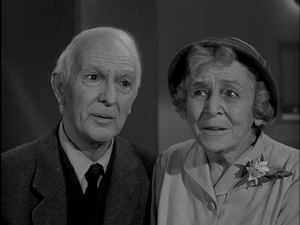
ORIGINALLY BROADCAST AS EPISODE 094
STARRING CAST: Joseph Schildkraut, Alma Platt, Noah Keen, Theodore Marcuse
WRITER: Rod Serling
DIRECTOR: Elliot Silverstein
SUMMARY: John and Marie Holt visit The New Life Corporation hoping to be transformed into young people. But they only have enough money for one of them to be transformed. John Holt undergoes the surgical procedure and within a few hours is back in his twenties. But poor Marie is still an old lady. Relucantly, John gets transformed back to an old man and they're able to spend the rest of their numbered days together.
REVIEW: V
Although "The Trade-Ins" has a most touching finale, the script suffers from oversentimentality and an implausible situation. Technology aside, the main characters strangely lack the foresight to realize that transforming only one member of their husband/wife duo will result in disaster. Naturally, an eightyish woman in poor health is not going to keep up with a man in his twenties. But this is television...and the situation can be reversed as easily and quickly as it developed. Ironically enough, a very similar version of this story must have been going through the starring actor's mind at the time - wishing that he could do the same thing. "Joseph Schildkraut's wife was dying during the production" relates Elliot Silverstein. I said, 'If you like, I can tell Buck [Houghton] to postpone shooting until a later date.' He said, 'No, I took this assignment, it must be finished.' But in between takes he was crying like a baby and I tried to comfort him as best I could." Edson Stroll remembers, "Rod Serling and I became friends when I did "Eye of the Beholder" and remained friends until the end. He always said that "The Trade Ins" was his favorite episode. That look you see on my face after I'm transformed? Elliot Silverstein accomplished that quite cleverly. He suddenly turned off all the lights on the set and fired off a rifle. The camera was still rolling. Then the lights were turned back on, and I have this look of bewilderment and sorrow."
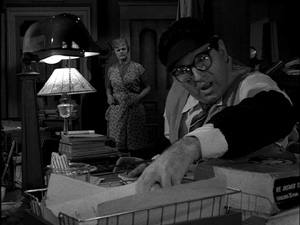
ORIGINALLY BROADCAST AS EPISODE 095
STARRING CAST: Theodore Bikel, Phyllis Love, Moyna McGill, Linden Chiles, Pete the Parrot
WRITER: Rod Serling
DIRECTOR: Lamont Johnson
SUMMARY: Oliver Crangle keeps records in his home of all the evil people of the world and their misdemeanors. He gets the idea to turn all the evil people into tiny gnomes at 4:00.
REVIEW: V
Theodore Bikel has obvious fun as Oliver Crangle in this simple fairy-tale story by Serling, adapted from Price Day's short story of the same title. While most men in their thirties are bankers, doctors, or ditch-diggers, Crangle is self-employed (or perhaps claiming disability?!) as a man who has a library of records with everyone's misdemeanors and reports them to higher authorities. Also seen in the cast is Moyna McGill, who also played the real-life role of Angela Lansbury's mother. Pete the Parrot, who has a prominent squacking part, was reportedly the pet of Rod Serling's daughters.
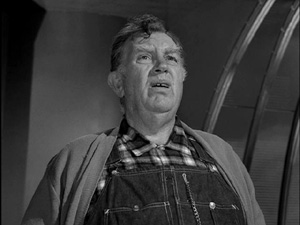
ORIGINALLY BROADCAST AS EPISODE 096
STARRING CAST: Andy Devine, Milton Selzer, Larry Breitman, Clem Bevans, Howard McNear, Dabbs Greer
WRITER: Rod Serling
DIRECTOR: Lamont Johnson
SUMMARY: Frisby, a general store owner who spins the biggest yarns west of the Rockies, gets a couple of odd customers one afternoon...who later summon him to their spaceship, prepared to take him back to their planet.
REVIEW: III
"Hocus Pocus and Frisby" is one of the more polished comedy episodes (perhaps second to "Will the Real Martian Please Stand Up"?). Few of us will escape this life without meeting someone like Somerset Frisby, a crack-voiced marshmellow of a man who claims to have done everything there is to do upon this Earth, and knows everything there is to know. The martian rubber masks prepared by William Tuttle are a little demonic looking, considering that the race of aliens seems somewhat placid. Whether or not they are really necessary is debatable, since they have already established themselves as human-like entities and don't reveal their true complexions until Frisby punches the leader in the chops, very late in the storyline.
The chubby Devine (who twenty-five years earlier co-starred in "Stagecoach" with John Wayne) running around the spaceship blowing his harmonica at the aliens who die at the sound of it, is a hoot.
This episode also features a guesting by character actor Howard McNear, who usually played Floyd the Barber on "The Andy Griffith Show". Cayuga Productions secured the actor on one of his weeks off of the classic sitcom.
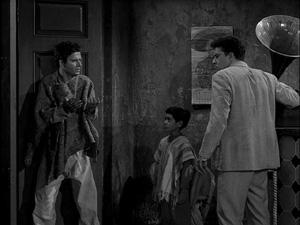
ORIGINALLY BROADCAST AS EPISODE 097
STARRING CAST: Geoffrey Horne, Edmund Vargas, Nico Minardos, Cliff Osmond
WRITER: Rod Serling
DIRECTOR: Allen H. Miner
SUMMARY: A man named Williams from beyond the stars stumbles into a small town in Mexico with a small book. The skeptical villagers shoot him and burn the book, which turned out to be a vaccine for all forms of cancer.
REVIEW: VII
Spanish composer and guitarist Laurindo Almedia's fine music for solo guitar, which would have probably fit better as accompaniment to a worthy feature film, is the single bright spot in an episode that was shoddily conceived, directed, and acted. Nico Minardos and Vladimir Sokoloff give it a good try, but Geoffrey Horne and the child playing Pedro kill it with performances that are utterly incompetent. Cliff Osmond, who played the bartender Manolo, later went on to be an acting teacher and for nearly 30 years after, was a familiar face in TV as a character actor.The townsfolk of the Mexican village look like a pack of timid rabbits, far removed from the rest of the world and its technology. Skepticism and prejudice were two subjects that Serling usually dealt well with; "The Gift", however, might as well be returned to the department store for a full refund.
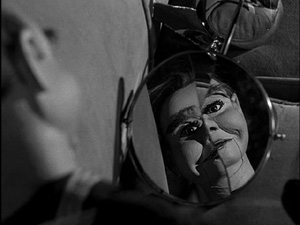
ORIGINALLY BROADCAST AS EPISODE 098
STARRING CAST: Cliff Robertson, Frank Sutton
WRITER: Rod Serling, based on a story by Leon Polk
DIRECTOR: Abner Biberman
SUMMARY: Jerry Etherson, ventriloquist, gets quite a surprise when his dummy comes alive.
REVIEW: I
It was the show that almost didn't happen...or at least not with Cliff Robertson. "I got the contracts for that show and looked at the shooting schedule, and I determined that I wasn't going to need to be at MGM for the first five days of production," Robertson says. "I didn't want to go out there early and just hang out. They had my airline ticket booked for the 9 am flight on a Friday morning. I called up and cancelled it, and then called a friend and told him what I'd done. He said, "Cliff, you're gonna catch hell!" The American Airlines flight took off as scheduled, right on time that Friday morning. About 15 minutes into the flight, the chief pilot had a heart attack and everybody perished." Luckily, Robertson caught another flight and was able to do the episode that would be one of the most memorable entries in his career.
The episode's title is all-inclusive. Zoom into a smoky nightclub stage with a ventriloquist dummy act, and the natural expectation is a cheerful, upbeat story about a voicethrower and his talking friend. By the finish, there isn't a grin to be had. This is a story about a declining, mentally-ill alcoholic whose life has been repeatedly beaten up and thrashed by an inanimate object. The natural solution would be to retire, go to a shrink, and get off the bottle. But that won't take care of this plight. There might've been a solution in working out another routine with his backup dummy, Goofy Goggles, but insanity prevails yet again.
Cliff Robertson pulled off an incredible performance. As in "A Hundred Yards Over the Rim", Robertson was again given a difficult character. This time, he had to play straight-man to a dummy, of all things. Again, he was very careful about not overplaying the material to the point of simplicity. So was Frank Sutton, whom many know for his role as the crotchety Seargent Carter of "Gomer Pyle, U.S.M.C." Here, Sutton is tremendously controlled as the agent who does his best to keep Jerry afloat. Ultimately, he resigns before he can find out the truth about the diabolical woodblock.
The multi-talented Robertson was not a ventriloquist, and the lines of Willie the dummy were dubbed in later. But unlike earlier episodes with likenesses made by William Tuttle and his assistants, a puppeteer was called in to make the dummies this time. The dummy that was to resemble Robertson (manned by actor George Murdock, as Willie-turned-human) didn't turn out as well as it could have; it bears little resemblance to him. But this is hardly important in an episode that was, otherwise, top-flight.
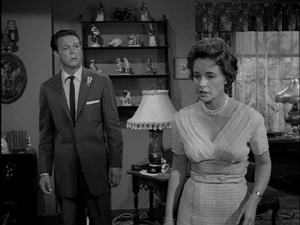
ORIGINALLY BROADCAST AS EPISODE 099
STARRING CAST: Alex Nicol, Phyllis Thaxter, Wallace Rooney, Helen Brown, Rickey Kelman
WRITER: Richard Matheson
DIRECTOR: John Brahm
SUMMARY: Alex Walker and his new bride return to his childhood home, ready to pack up and depart on their honeymoon. But the forces of his dead mother don't let them leave... or at least they don't let Alex leave.
REVIEW: III
Alex Nicol and Phyllis Thaxter (later to play Superman's mother) star in Richard Matheson's horrifying little story about going home again. The over-40 Alex Walker's emotional ties to the house and his dead mother are so strong that they can't even be broken by love...but the love he has for Virginia is short-lived, even after twelve years of courtship. The house, piece by piece, is deported back to the mid thirties, and no matter how hard Virginia tries to fight off the presence of Mrs. Henrietta Walker, she can't, and ultimately she loses the battle. Watching Alex slipping back into his domineering mother's arms, deciding not to sell the house, and giving up Virginia, is a truly painful process that transpires before our eyes - especially knowing how much Mother and Virginia hated each other and how she destroyed her own son and made him needy, needy only for her.
Matheson was apparently not pleased with the casting of Alex Nicol in the lead, and even went so far as to write a letter to Rod Serling about it and some other concerns he had over the declining quality of production of his scripts. Indeed, Nicol's performance is not one of the better ones. Of the two lead actors, Thaxter does the better job. If anyone, it was Wallace Rooney as the real estate agent who was miscast. He appeared in several episodes ("In His Image" and "The Rip Van Winkle Caper") and unfortunately his acting was very scripted-sounding in all three.
Some trivia...Phyllis Thaxter just may have gotten the part because she'd been married to Jim Aubrey, president of CBS at the time. They divorced right around the time the episode first aired, however. Aubrey was one of the advocates of TZ going to videotape in order to save money and never was a fan of the show, as he clearly never understood what it was all about.
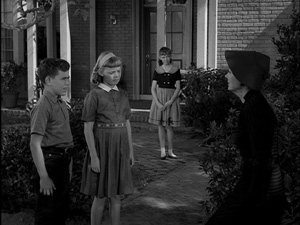
ORIGINALLY BROADCAST AS EPISODE 100
STARRING CAST: David White, Josephine Hutchinson, Dana Dillaway, Veronica Cartwright, Charles Herbert, Vaughn Taylor
WRITER: Ray Bradbury
DIRECTOR: James Sheldon and William Claxton
SUMMARY: After their mother dies, the kids of the Rogers family seek a replacement in the form of an electronic grandmother.
REVIEW: V
The only episode written by Ray Bradbury was "I Sing the Body Electric". Many fans of science fiction today would have relished more than just one offering from the great master, but in light of what was done with Bradbury's one adaptation for TV, it is probably best that it stands alone. No doubt this was due to significant re-vamps and re-shoots of scenes which were directed by two directors and edited and spliced into the final print. "The most important scene in my script was deleted," said Ray Bradbury. After the episode aired in early 1962, Bradbury decided that he wanted nothing more to do with the show. He remained bitter about both Rod Serling and Twilight Zone until the end of his life.
The original short story of the same title is an excellent one, but on television it falls painfully hard. David White and Josephine Hutchinson are well cast as the father and electronic grandmother, but the actors playing the children are inferior overall. Interestingly, they are all seen going off to college together in the last scene - presumably at age 18, but they are supposed to be a year or two apart in age. The awkward few minutes the family spends in the Facsimilie, Ltd. store seems to leave out many important details, such as determining the cost of the grandmother and perhaps signing a few contracts. Somehow, the electronic granny, who is about as unrobotic and unassuming as a real grandmother, walks down the street to the family's home. "Josephine Hutchinson had conducted some acting seminars that I participated in...she was a drama coach and I'd been in a class of hers before doing that episode," Veronica Cartwright recalls. "She was very kind...much like a grandmother." But there was another person who didn't care so much for Hutchinson, curiously enough. "That was the one Twilight Zone experience that I didn't like," recalls director James Sheldon. "I thought she was all wrong for the part. It's fine if the actor is a very good actor. But they keep rerunning it so I've kinda let it go." After Sheldon did his part, William Claxton came in to direct a second shooting of certain scenes that didn't work well originally.
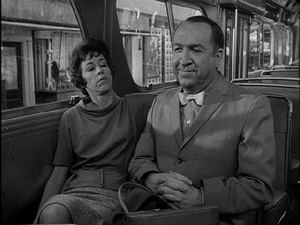
ORIGINALLY BROADCAST AS EPISODE 101
STARRING CAST: Carol Burnett, Jesse White, Howard Smith
WRITER: Rod Serling
DIRECTOR: Christian Nyby
SUMMARY: Agnes Grep, a klutz, loses jobs and is behind in her rent. Cavender, an angel at the risk of reclassification who has not earned his wings, gets an assignment to go down to Earth to help her.
REVIEW: VI
Comedy was not Rod Serling's forte, but it certainly was Carol Burnett's. Even in this early appearance, it's obvious that the 29-year-old "Garry Moore Show" regular was destined for superstardom. Also featured are small guest appearances by a number of other comedy actors including Albert Carrier, Frank Behrens, Donna Douglas, Sandra Gould, and John Fiedler. Burnett and Jesse White are certainly well cast in the leads but the material simply does not work. Agnes Grep is a far cry from Eunice Harper-Higgins, Mrs. Wiggins, or any of the other countless wacky characters Carol Burnett would play over the next twenty-odd years. Like "Mr. Bevis", this is another guardian angel plot that Serling had an obscure affection for. Multiple non sequiturs in the plot elements are especially distracting, including a stunt double for Burnett crashing into a one way mirror into the movie theater manager's office and a double for a bus driver diving out the window of the bus. A few of the older versions of the episode feature a laugh track; the reasons for this are uncertain. It could be that the network intended this as a spinoff for Burnett and/or White and wanted to see how a comedy Twilight Zone would play against canned laughter (which surprisingly enough, makes this particular segment far easier to watch!)
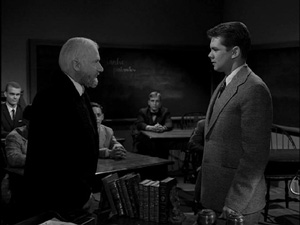
ORIGINALLY BROADCAST AS EPISODE 102
STARRING CAST: Donald Pleasence, Phillippa Bevans, Tom Lowell, Russell Horton, Buddy Hart
WRITER: Rod Serling
DIRECTOR: Robert Ellis Miller
SUMMARY: Professor Ellis Fowler is being forced to retire. After fifty-one years, his teaching methods are outmoded and no longer so effective but he can't envision his life continuing if he can't teach.
RATING: III
Professor Ellis Fowler gets the greatest gift that any educator can hope to get - students who went above and beyond, and achieved something great as a result of their teaching or influence. "Be ashamed to die until you've won some victory for humanity" is the Horace Mann quote printed on a plaque in Fowler's schoolyard. But more appropriately, "All teachers should go to their graves ashamed unless their former students tell them that they were good at their job." Fowler nearly commits suicide over realizing that he probably didn't do as well as he could have. Not many of his students cared about the great philosophers, or maybe they would have if he'd taught them differently. Just in the nick of time, the spirits of a group of his former students appear to let him know what he meant to them. Having received the accolades, Fowler throws in the towel voluntarily, having realized he's taught all he could ever have hoped to teach. Donald Pleasence, best known for his starring role as Dr. Sam Loomis in John Carpenter's "Halloween" in 1978, submits an unmatchable performance. "It was great fun doing that Twilight Zone," remembers Tom Lowell. "The salt and pepper jacket I wore was my own, and I used it in other productions as well."
"The Changing of the Guard" was the last half-hour episode of Twilight Zone that would be seen for over a year. And ironically, the episode's title could not have been more fitting; Twilight Zone and Cayuga Productions underwent some permanent changes. When Twilight Zone's sponsors backed out in the spring of 1962, the show was cancelled and consequently, its producer backed out too. Buck Houghton accepted work elsewhere and when the show was finally picked up again sometime during the fall, to replace the failing program "Fair Exchange" mid-season, a new producer was needed … and fast. In attempt to bring in more viewers, the decision was made to make Twilight Zone into an hour show. Cayuga Productions went back into business, and another seven or eight expanded scripts were generated by Serling, Beaumont, and Matheson, and a few from outsiders joined the ranks as well.
Some good things did emerge, despite the break-up of the powers that made the first three years so magnificent. "In His Image", which featured actors who had already done Twilight Zone before (George Grizzard, Gail Kobe, Katherine Squire) was a good choice to open the season. It was a dynamite script that plunged deeply, and at 48 minutes there were more opportunities than could ever have been hoped for in 22 minutes. "The Incredible World of Horace Ford" by Reginald Rose, "Jess-Belle" by Earl Hamner, "Death Ship" by Richard Matheson, and "Miniature" by Charles Beaumont were all in the production lineup, with first-rate actors secured for the parts. Twilight Zone had not yet reached twilight.
© 2002-2015 The Twilight Zone Museum. All Rights Reserved. Use of the material herein without written permission from the author is strictly prohibited. See website disclaimer for details.
